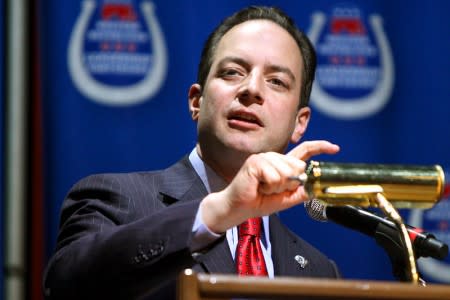The Constitution Outside the Courts: Reince Priebus
Many Americans, not just the courts, help shape the meaning of the Constitution in the nation’s life. This series explains the actual or potential contributions of these other individuals or groups. Today’s Constitution-maker is Reince Priebus, the national Republican chairman, who is seeking to enhance political party control of a key feature of presidential campaigns – the debates.
***
Reince Priebus. Creative Commons image from Gage Skidmore
Generations ago, Americans began a constitutional dare – entrusting much of the operation of the nation’s political life to privately organized political parties, not always accountable to the people as a whole. While constitutions and public laws at the federal, state and local levels control who may vote, and when, the parties actually are the operating engines of politics – in other words, they make it work, especially since politics runs on constantly, not just at election times.
The American presidency probably is the world’s most powerful office, and yet the mode of electing the occupant of that position is not carried out entirely as a function of government, or even as the true choice of the people in this Republic. It is the province, mainly, of two political parties, run by their own rules, energized by their own agendas, and endowed with the power to decide who gets included in their ranks.
In short, they do not represent everyone in the country. Even so, they operate under the protection of the Constitution – especially, the First Amendment and its promise that people will have broad “freedom of association” to pursue common political and governmental goals. The way they conduct politics deeply affects the integrity and credibility of the process of choosing public leaders.
Among the many political party-dominated events in the choice of a president every four years are the debates conducted as part of the campaign running up to Election Day. The Commission on Presidential Debates plans and carries out those events. Its name makes it sound as if it were a government agency, but it is not; it is a private corporation run by the two dominant parties. Some of these debates have been known to have a profound influence on who gets a party’s nomination, and who wins the election.
Few Americans realize, perhaps, that either one of the two major parties could simply refuse to stage those debates, and there would then be none. And that ultimate authority, even if it is never actually used, gives each of the two parties very broad power to determine how the debates will be run, and thus to try to maximize their positive effect on that party’s ambitions.
The current national chairman of the Republican Party, Reince Priebus, recently offered an illustration of that power. Disturbed by reports that the NBC commercial TV network and the CNN cable TV network were planning to produce documentaries on the public life of Hillary Clinton, Priebus sternly warned both that there could be serious, negative consequences if they went ahead with the plans. The programs, he said, would provide “an extended commercial” for the presidential campaign that Clinton ultimately may run in 2016. He suggested that such broadcasts would be “a deliberate attempt” to promote a Clinton candidacy.
Setting a deadline for each network to abandon the programming, Priebus vowed that, otherwise, he would seek a vote of his national committee to “neither partner with you in 2016 primary debates nor sanction primary debates which you sponsor.”
The networks, of course, have a First Amendment right to choose their own programming. But, while the government itself could not veto their programs, the First Amendment does not operate against a private entity, like a political party.
Even if the GOP’s Priebus does not succeed in getting either broadcast cancelled, he may well have influenced the actual content of how those shows ultimately turned out. And, in that event, the use of presidential debate management as a bargaining tool will have made him something of a Constitution-maker.
Lyle Denniston is the National Constitution Center’s adviser on constitutional literacy. He has reported on the Supreme Court for 55 years, currently covering it for SCOTUSblog, an online clearinghouse of information about the Supreme Court’s work.
Recent Constitution Daily Stories
Congress, President face a stormy season in September
Five little-known men who almost became president


